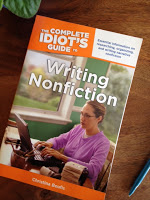Better Writing=More Money! Smart Tips on Crafting Nonfiction
Posted: December 17, 2012
In order to make money being a freelance writer, whatever the genre, it's important to be a good writer. Nonfiction can present it's own particular challenges, though. Here's a little extra help in that area.
In order to make money being a freelance writer, whatever the genre, it's important to be a good writer. Nonfiction can present it's own particular challenges, though. Here's a little extra help in that area.
[caption id="attachment_11057" align="alignright" width="150"] image from Dollars and Deadlines[/caption]While this blog focuses on making more money in less time, it's important to write well. Duh, right? Well, today's post is loaded with smart, practical advice from Christina Boufis, author of the new book, The Complete Idiot's Guide to Writing Nonfiction. So let's get right to it:
image from Dollars and Deadlines[/caption]While this blog focuses on making more money in less time, it's important to write well. Duh, right? Well, today's post is loaded with smart, practical advice from Christina Boufis, author of the new book, The Complete Idiot's Guide to Writing Nonfiction. So let's get right to it:
Christina, you cover nonfiction articles in your new book, The Complete Idiot's Guide to Writing Nonfiction. What kinds of tips do you give freelancers for writing stronger, more informative articles?
First and foremost, as a nonfiction writer, you need to make sure you get your facts straight. Nothing can make you lose credibility faster if you don't. That means double and sometimes triple-checking statistics, quotations, sources, government publications, so that you are your own fact-checker.
That aside, your lede has to be so compelling that the reader is completely hooked and wants to keep reading. I like starting with an intriguing bit of dialogue, an arresting statistic, or something ironic or humorous. If you can be funny or witty (appropriate to the subject matter), you'll keep your reader engaged. Then on the sentence level, my biggest tip is to rethink your verbs. I tell my students those are the $500 words. Adjectives are probably worth a nickel, and adverbs a penny. I stole that metaphor from somewhere, but it's true. We tend to use the same verbs over and over, so finding a strong verb (or one that is used in a different context) just punches up your prose.
New writers often struggle with structuring articles. Any tips on how to do that?
I have a picture of an iceberg over my desk, and I tell my students to think of the first draft as the iceberg draft. Don't worry yet about structure; just get it all down. Then on subsequent drafts you're looking at the water line: what needs to be submerged? What needs to be above the surface? It's at this point that I tend to do an outline, so I can find out whether I'm ordering information correctly or not.
And then ask yourself for every paragraph: what am I really saying here? How well am I saying it? How does it fit with the whole? I try to end with a really good quote or something surprising, so the piece ends on a lift and ideally stays in the reader's mind. If I can't figure out how to end something, I take a look at the beginning. Is there an image I can return to? Also, your lede is your promise to the reader. It's like your train ticket. If you've told the reader you're going to Milan and the end of the piece you wind up in Venice, than something went awry with the piece.
I'm a service journalist primarily, and find that I have a hard time writing profiles. Do you have any strategies you use to write a profile that captures a reader's attention?
Profiles are hard as you're encapsulating a person (or some notable aspect of her life) in a very short form. But I love reading profiles because they're all basically sort of heroes or heroine's journeys: what has this person done that's so remarkable, unexpected, admirable? What obstacles did they overcome to get there? It's the tension that can make a profile come to life, so I basically start with the conflict, the seemingly impossible odds.
Don't try to build tension or save it for the end to build suspense, as some of my students try to. On a separate note, I tell my students to scour their local papers for profile subjects. I've sold stories to national magazines based on a short profile I've read in my hometown paper, so always look for a person, an unsung hero or heroine, who might have national appeal.
Read the entire article Better Writing=More Money! Smart Tips on Crafting Nonfiction, by Kelly James-Enger at Dollars and Deadlines.